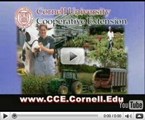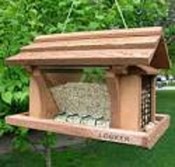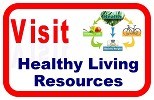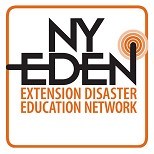Take a Fresh Look at Nature with Project FeederWatch
A new season for the Project FeederWatch citizen-science project kicked off on
November 9, 2013. Anyone with an interest in birds and nature is invited to be part of
the action. FeederWatch has a fresh new look for its 27th season, plus new web tools
that make participation and exploration even easier and more fun. Project FeederWatch
is a joint research and education project of the Cornell Lab of Ornithology and Bird
Studies Canada.
Join the tens of thousands of people who keep tabs on the birds that come to their
feeders from November through April. Participants submit their observations to the
Cornell Lab of Ornithology. These long-term data from across North America could not
be gathered any other way. Observations help reveal important patterns in bird
distribution and numbers that may be changing over time at a continental scale or in a
participant’s own backyard.
Project FeederWatch is a winter-long survey of birds that visit feeders at backyards,
nature centers, community areas, and other locales in North America. FeederWatchers
periodically count the birds they see at their feeders from November through early
April and send their counts to Project FeederWatch. FeederWatch data help scientists
track broadscale movements of winter bird populations and long-term trends in bird
distribution and abundance.
Anyone interested in birds can participate. FeederWatch is conducted by people of all
skill levels and backgrounds, including children, families, individuals, classrooms,
retired persons, youth groups, nature centers, and bird clubs. Participants watch their
feeders as much or as little as they want over two consecutive days as often as every
week (less often is fine). They count birds that appear in their count site because of
something that they provided (plantings, food, or water).
To learn more about joining Project FeederWatch and to sign up, visit
www.FeederWatch.org or call the Cornell Lab toll-free at 866-989-2473. In return for the
$15.00 fee ($12.00 for Cornell Lab members), participants receive the FeederWatcher
Handbook and Instructions with tips on how to successfully attract birds to your feeders,
an identification poster of the most common feeder birds, and a calendar. Participants
also receive Winter Bird Highlights, an annual summary of FeederWatch findings, as well
as the Cornell Lab’s quarterly newsletter, Living Bird News.
According to FeederWatch project leader Emma Greig, there is a new interactive tool
called “Common Feeder Birds” that allows people to learn about the food and feeder
preferences of nearly 100 species based on data collected by participants. “The tool can
be used to predict what birds can be attracted to an area so you can offer foods
strategically to attract desired species.”
Observations from a record number of participants last season helped scientists follow
the changes in woodpecker and nuthatch populations in the Midwest where trees were
infested with invasive emerald ash borer beetles. “We need continued FeederWatch
data on woodpecker and nuthatch populations throughout North America to better
understand the long-term consequences of this beetle invasion,” Greig says. “We also
need renewed FeederWatcher effort to monitor the health of house Finches, which are
susceptible to a disease that causes swelling around the eyes. Our participants will be
asked to report whether they looked for the disease and whether they saw sick birds.”
The Cornell Lab of Ornithology is a membership institution dedicated to interpreting
and conserving the earth’s biological diversity through research, education and citizen
science focused on birds. The massive amounts of data collected by FeederWatchers
across the continent help scientists understand:
- long-term trends in bird distribution and abundance
- the timing and extent of winter irruptions of winter finches and other species.
- expansions or contractions in the winter ranges of feeder birds
- the kinds of foods and environmental factors that attract birds
- how disease is spread among birds that visit feeders
Visit the Cornell Lab’s website at http://www.birds.cornell.edu.
Cornell Cooperative Extension provides equal program and employment
opportunities.





